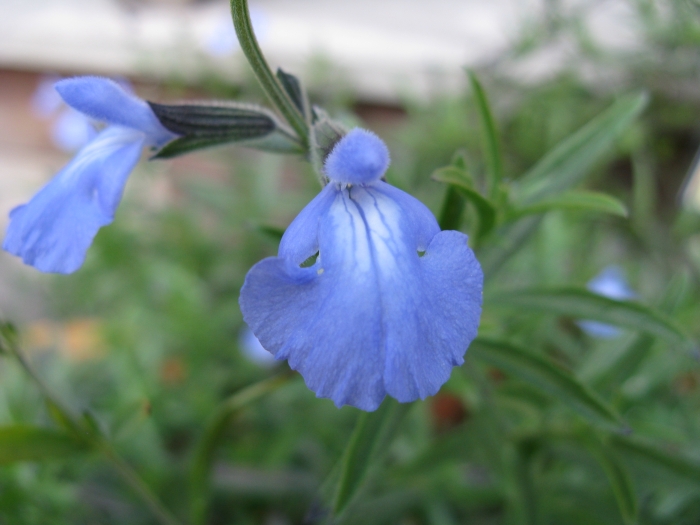Azure Blue Sage
(Salvia azurea)
Azure Blue Sage (Salvia azurea)
/
/

KENPEI
CC BY-SA 3.0
Image By:
KENPEI
Recorded By:
Copyright:
CC BY-SA 3.0
Copyright Notice:
Photo by: KENPEI | License Type: CC BY-SA 3.0 | License URL: http://creativecommons.org/licenses/by-sa/3.0/ | Uploader: KENPEI | Publisher: Wikimedia Commons | Title: Salvia_azurea1.jpg | Notes: Preparing upload using [[User:Flickr upload bot|Flickr upload bot]] |
















































Estimated Native Range
Summary
Salvia azurea, commonly known as azure blue sage, is a herbaceous perennial native to prairie grasslands, glades, and open woodlands of Central and Eastern North America. It typically grows to a height of 2-3 feet (0.6-0.9 meters) and spreads 1-2 feet (0.3-0.6 meters). The plant is characterized by its erect, slender stems and narrow, lance-shaped leaves. From late summer to autumn, it produces striking azure blue flowers, occasionally white, that are about 1⁄4 to 1⁄2 inch (6.4 to 12.7 mm) long, arranged in branched or unbranched spikes. These flowers are highly attractive to bees, butterflies, and hummingbirds.
Azure blue sage is valued for its vibrant blue flowers and its ability to thrive in hot, dry conditions, making it an excellent choice for xeriscaping. It is often used in native plant gardens, perennial borders, and as a naturalizing element in informal settings. To prevent the long, unbranched stems from flopping, gardeners may prune the plant early in the growing season to encourage a more compact, branched habit. It requires full sun and can tolerate a range of soil types, from clay to gravel to loam, provided they have good drainage. While it can survive with medium amounts of water, it is drought-tolerant once established.CC BY-SA 4.0
Azure blue sage is valued for its vibrant blue flowers and its ability to thrive in hot, dry conditions, making it an excellent choice for xeriscaping. It is often used in native plant gardens, perennial borders, and as a naturalizing element in informal settings. To prevent the long, unbranched stems from flopping, gardeners may prune the plant early in the growing season to encourage a more compact, branched habit. It requires full sun and can tolerate a range of soil types, from clay to gravel to loam, provided they have good drainage. While it can survive with medium amounts of water, it is drought-tolerant once established.CC BY-SA 4.0
Plant Description
- Plant Type: Herb
- Height: 3-5 feet
- Width: 2-4 feet
- Growth Rate: Rapid
- Flower Color: Blue
- Flowering Season: Summer, Fall
- Leaf Retention: Deciduous
Growth Requirements
- Sun: Full Sun
- Water: Medium
- Drainage: Medium, Fast
Common Uses
Bee Garden, Bird Garden, Border Plant, Butterfly Garden, Deer Resistant, Drought Tolerant, Fragrant, Groundcover, Hummingbird Garden, Low Maintenance, Rabbit Resistant, Rock Garden, Salt Tolerant, Showy Flowers, Street Planting
Natural Habitat
Native to prairie grasslands, glades, and open woodlands of Central and Eastern North America
Other Names
Common Names: Azure Blue Sage, Pitcher Sage, Prairie Sage, Azure Sage
Scientific Names: , Salvia azurea, Salvia azurea var. grandiflora, Salvia pitcheri, Salvia mexicana, Salvia azurea subsp. pitcheri, Salvia azurea var. pitcheri, Salvia angustifolia, Salvia azurea subsp. media, Salvia coriifolia
GBIF Accepted Name: Salvia azurea Michx. ex Vahl